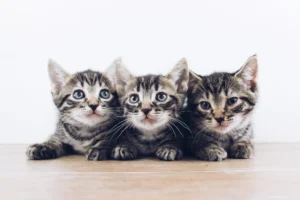Cats are known for being independent and aloof creatures, but deep down, they also crave affection and attention just like any other pet. Understanding why cats need affection is essential for building a strong bond with your feline companion.
Cats need affection for their overall well-being and happiness. Providing love and attention to your cat can improve their mental and physical health, reduce stress and anxiety, and strengthen the bond between you and your furry friend. In this blog post, we will explore the reasons why cats need affection and how you can meet their emotional needs effectively.
The Importance of Affection for Cats
Cats may seem independent, but they thrive on affection from their human companions. Providing your feline friend with love and attention is crucial for their overall well-being. When cats receive affection, it boosts their mood and reduces stress. Just like humans, cats crave emotional connection and bonding time.
Affection also plays a significant role in shaping a cat’s behavior. Cats that receive regular love and attention are often more social, less anxious, and better behaved. By showering your cat with affection, you are building trust and strengthening your bond with them. This can lead to a happier and healthier relationship between you and your feline companion.
In essence, affection is like a lifeline for cats. It provides them with security, comfort, and emotional fulfillment. So, the next time your cat curls up in your lap or rubs against your leg, remember that they are seeking your affection to feel loved and cared for.
Signs Your Cat Craves Affection
- Excessive Purring: If your cat is purring loudly and constantly seeking your attention, it’s a clear sign that they are in need of some extra love.
- Kneading: When your cat kneads on you with their paws, it’s a sign of affection and a way for them to show their love and seek attention.
- Following You Around: Cats that constantly follow you from room to room are often seeking companionship and affection.
- Head Bunting: This behavior, where a cat gently bumps their head against you, is a way for them to show affection and seek closeness.
- Increased Vocalization: Cats that are meowing more than usual may be trying to communicate their need for attention and affection.
Remember, every cat is unique and may show affection in different ways. By recognizing these signs and responding with love and attention, you can ensure your furry friend feels cherished and secure in your presence.
How to Show Affection to Your Cat
Cats may have a reputation for being independent, but they still crave love and affection from their human companions. Here are some practical tips on how to show your furry friend just how much you care:
Petting: Cats love to be petted, especially on their head, chin, and behind the ears. Gently stroking your cat can make them feel loved and secure.
Playtime: Engage in interactive play sessions with your cat using toys like feather wands or laser pointers. This not only provides mental stimulation but also strengthens the bond between you and your feline friend.
Grooming: Brushing your cat regularly helps maintain their coat and prevents matting. It’s also a great way to show your cat love and affection while keeping them looking their best.
Quality Time: Simply spending time with your cat, whether it’s cuddling on the couch or relaxing together in the sun, can go a long way in nurturing your relationship.
Respect Their Boundaries: Remember that cats have their own personalities and preferences. Be attuned to your cat’s body language and cues to ensure you’re showing affection in a way they appreciate.
The Benefits of Affection for Cats’ Health
Showing affection to your cat is not just about making them feel good—it can also have significant benefits for their physical health. Here are some ways that expressing love and care can positively impact your feline companion’s well-being:
Boosted Immune System: Studies have shown that cats who receive affection and attention from their owners have stronger immune systems, making them less susceptible to illnesses.
Stress Reduction: Affectionate interactions, like petting and cuddling, can help reduce your cat’s stress levels and promote relaxation. This, in turn, can lower their risk of developing stress-related health issues.
Weight Management: Engaging in interactive play and spending quality time with your cat can help them stay active and maintain a healthy weight. Obesity is a common health issue in cats, so regular affectionate interactions can contribute to their overall fitness.
Improved Behavior: Cats who feel loved and cared for are more likely to exhibit positive behaviors and have better mental well-being. Affection can help prevent behavioral problems and strengthen the bond between you and your cat.
Enhanced Socialization: Regular affection can help your cat feel more comfortable around people and other animals, leading to improved social skills and fewer instances of anxiety or aggression.
By providing your cat with the love and attention they need, you not only strengthen your bond with them but also contribute to their long-term health and happiness. So, shower your feline friend with affection—it’s beneficial for both of you.
Building a Strong Bond Through Affection
Cats may seem independent, but they actually thrive on affection just like humans do. By showering your feline friend with love, you are not only making them feel cherished but also building a strong bond that will last a lifetime. Regular cuddles, strokes, and positive interactions create a sense of security and trust in your cat, ultimately strengthening your relationship. Remember, a little affection goes a long way in forging a deep connection with your furry companion.
Understanding Your Cat’s Love Language
Cats have a subtle way of showing their need for affection, and it’s essential to understand their unique love language. Pay attention to your cat’s body language – purring, kneading, rubbing against you are all signs of affection. Additionally, some cats may prefer physical touch, while others may enjoy playtime or verbal praise. By observing and responding to your cat’s cues, you can tailor your affection to meet their specific preferences, enhancing your bond even further.
Tips for Showing Affection to Your Cat:
- Gentle Petting: Most cats enjoy gentle strokes from head to tail, but pay attention to their body language to ensure they are comfortable.
- Playtime: Engage in interactive play sessions with your cat using toys to show affection and provide mental stimulation.
- Verbal Communication: Talk to your cat in a soothing voice to convey love and comfort.
- Respect Boundaries: Remember that cats also need alone time, so respect their space when they signal the need for solitude.
- Treats and Rewards: Use treats as a way to reward your cat for positive behavior and show them love in a tangible way.
For more insights into understanding and meeting your cat’s need for affection, consider visiting the American Association of Feline Practitioners’ guide on feline behavior: A Guide to Understanding Your Cat’s Behavior.
Overcoming Challenges in Showing Affection
Cats may not always be as overtly affectionate as dogs, but they still deeply crave love and attention from their human companions. One common challenge pet owners face is understanding their cat’s unique ways of expressing affection. While dogs may wag their tails and lick your face, cats show their love in more subtle ways, like gentle purring, kneading, or rubbing against you. It’s important to pay attention to these cues and respond positively to them to foster a strong bond with your cat.
Another hurdle in showing affection to cats is their independent nature. Some cats are more aloof than others and may not seek out attention as readily. However, providing a safe and comfortable environment, along with gentle encouragement, can help them open up and become more receptive to affection. Patience is key when building trust with a cat, so take your time and let your feline friend set the pace.
To overcome these challenges, try incorporating interactive play sessions into your daily routine to strengthen your bond with your cat. Use toys to engage their natural hunting instincts and provide mental stimulation. This will not only show your cat that you care but also help them release pent-up energy and reduce stress levels.
Pro Tip: Remember that consistency is key when building a loving relationship with your cat. Establishing a routine for feeding, playtime, and grooming can create a sense of security and predictability that will make your cat feel safe and loved.
Creating a Positive Environment for Affection
Creating a positive environment for your cat is crucial in fostering a loving and affectionate relationship. Cats thrive in calm and quiet surroundings, so try to minimize loud noises and sudden movements that may startle or stress them out. Providing cozy hiding spots, scratching posts, and comfortable resting areas will help your cat feel secure and at ease in their environment.
Ensure that your cat has access to fresh water, nutritious food, and a clean litter box at all times. A well-fed and clean cat is a happy cat, and their overall well-being directly impacts their willingness to seek affection from you. Additionally, regular grooming sessions can strengthen the bond between you and your cat, as grooming mimics social bonding behaviors in the wild.
Key Insight: Cats are sensitive creatures that respond positively to positive reinforcement. When they exhibit affectionate behaviors, such as cuddling or gentle headbutting, be sure to reward them with verbal praise, pets, or treats. This will reinforce their bond with you and encourage them to seek out affectionate interactions more frequently.
By creating a nurturing and supportive environment that caters to your cat’s physical and emotional needs, you can lay the foundation for a deep and lasting bond built on trust and affection. Your efforts will be rewarded with a happy, loving, and contented feline companion.
Alex, a passionate animal lover, has experience in training and understanding animal behavior. As a proud pet parent to two dogs and three cats, he founded AnimalReport.net to share insights from animal experts and expand his knowledge of the animal kingdom.




